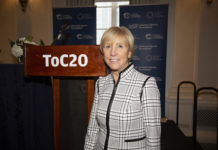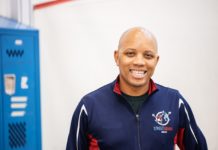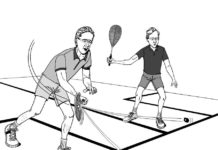Squash Magazine, as part of a monthly feature, will talk to a member of the Squash Professionals Affiliate Program. Nathan Dugan, the Head professional at the Cleveland Racquet Club in Cleveland (OH), took some time to share his views on squash in the US.
 Where were you born ?
Where were you born ?
Outside London in Amersham, in Buckinghamshire. 20 minutes from Heathrow
How old were you when you started playing squash?
Six years old. It’s a funny story actually. My dad bought my mom a Grays light blue racquet but she had a Donnay she always liked to play with so I got the Grays light blue. Avid players back then were using either the Dunlop Maxfli or the Grays. We belonged to the Holmegreen Sports Club and the pro, Les Snipes, said I was too young to play. My dad convinced him that I had solid eye hand coordination so he let me hit. Soon after I was hitting in the afternoons with the 12 year olds. I played my first tournament at age eight. I won the spin, but proceeded to drop the match 27-0! I played at the club and in local events growing up and then played on the PSA tour from ages 19-23.
What do you consider your biggest achievement on the squash court?
I did win three PSA events but I would have to say getting to the finals of the U23’s was a great accomplishment, especially when you consider the field included Lee Beachhill, Marcus Barrett, Adam Toes, Lee Drew and Adrian Grant.
Who was your biggest influence in the sport?
Jonah Barrington was so inspirational to talk to and Bryan Patterson because of his passion for the sport. Those two, along with Ross Norman whom I met playing leagues in England.
I know you worked with Geoff Mitchell at the Chatham Club (NJ), compare squash in the Midwest to the East Coast.
Squash is not as competitive or cutthroat here. The families get on better with each other here and work together. I work with St Louis, Michigan, and Cleveland kids at tournaments and the guys from there look after my kids when I’m not at a tournament. We are just not as cliquish as East Coast. That and the obvious lack of courts.
Do you still play competitively?
I don’t. I’m really here to grow the game. One thing we are working on is launching an urban program in June. I really feel more pros should be looking to advance the game, as opposed to looking out only for themselves.
If not for squash, what do you think you would be doing?
I would be a golf pro. I’m currently a three handicap and can typically go out and shoot in the mid seventies.
Tell us who you think of as the ideal squash pro.
I think Julian Wellings is a great example. He is solid on the admin side, which most pros are notoriously bad at, along with being flexible in his teaching style, depending upon who the student is. Many coaches only teach one style, and that’s not the way it should be done. On the East Coast, I have great respect for the way Richard Chin and Daniel Sharplin run their programs.





